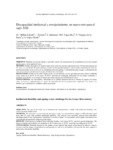Discapacidad intelectual y envejecimiento: un nuevo reto para el siglo XXI

Use este enlace para citar
http://hdl.handle.net/2183/14339Coleccións
- Investigación (FCS) [1295]
Metadatos
Mostrar o rexistro completo do ítemTítulo
Discapacidad intelectual y envejecimiento: un nuevo reto para el siglo XXITítulo(s) alternativo(s)
Intellectual disability and ageing: a new challenge for the twenty-first centuryAutor(es)
Data
2003-09Cita bibliográfica
Millán-Calenti JC, Meleiro L, Quintana J, López-Rey MJ, Vázquez de la Parra P, López-Sande A. Discapacidad intelectual y envejecimiento: un nuevo reto para el siglo XXI. Rev Esp Geriatr Gerontol. 2003;38(5):266-274.
Resumo
[Resumen] OBJETIVO: Mediante el presente trabajo se pretende conocer las características de la población con retraso mental que ha supera- do la edad de 45 años.
MÉTODO: Estudio descriptivo de carácter transversal, entre una muestra representativa de 189 personas mayores de 45 años, con certificado de minusvalía que acredite la discapacidad psíquica, seleccionadas aleatoriamente entre las institucionalizadas en los centros de la comunidad autónoma gallega. La herramienta para recoger la información ha sido un cuestionario de elaboración propia, debidamente contrastado.
RESULTADOS: El 60% de los entrevistados reside con sus familias, con las que mantienen una relación calificada como buena en el 49,7% de los casos. El 48,7% presenta un coeficiente intelectual con un retraso moderado, y profundo en el 36,5%; no se conoce el origen del retraso mental en el 42,85% de los casos.
CONCLUSIONES: Las necesidades detectadas en la calidad asistencial llevan a concluir la urgencia de actuar sobre los recursos, equipamientos y el grado de especialización de los profesionales implicados, sin obviar a las familias, que constituyen el verdadero soporte asistencial. [Abstract] OBJECTIVE: The aim of this study was to determine the characteristics of adults with intellectual disability who survive for more than45 years.
METHODS: We performed a cross-sectional, descriptive study of a representative sample of 189 individuals aged more than 45 years with certified intellectual disability. The subjects were randomly selected from individuals attending centres of the Autonomous Community of Galicia in Spain. The instrument used to gather information was a specifically-designed and validated questionnaire.
RESULTS: Sixty percent of subjects lived with their families, with whom 49.7% reported a good relationship. The degree of intellectual disability was moderate in 49.7% and severe in 36.5%. Aetiology was unknown in 42.5%.
CONCLUSIONS: Shortfalls detected in the quality of care indicate that urgent action should be taken to improve resources and the degree of specialisation among staff, as well as to aid families, who provide the main support to individuals with mental disability.
Palabras chave
Envejecimiento
Discapacidad intelectual
Retraso mental
Actividades de la vida diaria
Dependencia
Ageing
Intellectual disability
Mental deficiency
Daily life activities
Dependence
Discapacidad intelectual
Retraso mental
Actividades de la vida diaria
Dependencia
Ageing
Intellectual disability
Mental deficiency
Daily life activities
Dependence
Versión do editor
Dereitos
NOTICE: this is the author’s version of a work that was accepted for publication in Revista Española de Geriatría y Gerontología. Changes resulting from the publishing process, such as peer review, editing, corrections, structural formatting, and other quality control mechanisms may not be reflected in this document. Changes may have been made to this work since it was submitted for publication.





